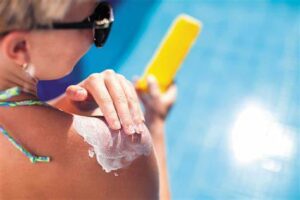By Melissa Grych
There are tremendous health benefits to being outdoors during the summer months, from soaking up some vitamin D that the sun provides to the beneficial low-impact exercise you can get in a pool. However, there also are some dangers to consider.

Avoid heat exhaustion
Heat exhaustion can affect anyone, but especially young children, the elderly and anyone who is already sick. In severe cases, it can lead to heat stroke, causing liver and kidney failure.Symptoms of heat exhaustion can include:
• Dizziness
• Headache
• Heavy sweating
• Muscle cramps
• Paleness
• Tiredness
• Upset stomach/vomiting and fainting
• Weakness
What to do
If heat exhaustion is suspected, take these steps:
• Immediately move the person to a shaded or indoor area,
• Hydrate with cool, non- alcoholic beverages,
• Try a cool (not cold) bath or compresses, and
• If symptoms are severe or persist for more than an hour, seek immediate medical attention.
Protect yourself
from the rays
As we flock outdoors, it’s important to remember that skin cancer is the most common form of cancer in the United States, with one in five people diagnosed with it. Fortunately, there are simple ways to reduce your risks of developing skin cancer.
Seek shade — The most effective way to reduce your exposure to damaging UV rays is to avoid direct sunlight for prolonged periods of time. This is especially important between the hours of 10 a.m. – 4 p.m. when the sun’s rays are strongest.
Wear protective clothing — Clothing can go a long way toward protecting your skin from the sun. Long-sleeved shirts and long pants offer the most protection.
Dark colored clothing and tightly woven fabrics also are effective. Many clothing manufacturers offer lines that have a UV protection factor (UPF) value listed, which generally runs from 15 to 50+. The higher the UPF, the greater the protection. And don’t forget a hat with a 2- to 3-inch brim all the way around!
Use sunscreen — Thirty minutes before going outdoors, apply sunscreen that’s rated at least SPF (sun protection factor) 15 or higher. It’s important to note that higher SPF values don’t mean you can remain in the sun longer. Also, choose a broad-spectrum sunscreen so you’ll be protected from both UVA and UVB rays. Even if your sunscreen is labeled “waterproof” or “sweatproof,” you must still reapply it about every hour, especially when you’re wet.
Wear sunglasses — It’s equally important to protect your eyes and the delicate skin around them with sunglasses. The ideal shades should block 99 percent to 100 percent of UVA and UVB rays.
Labels that say “UV absorption up to 400 nm” or “Meets ANSI UV Requirements” mean the glasses block at least 99 percent of UV rays. Avoid sunglasses that are labeled “cosmetic” since they generally block only 70 percent of UV rays. And if there is no label, assume there’s no protection.
